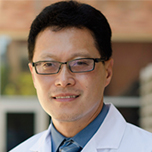Light at the End of SARS-CoV-2: Multi-Dimensional Imaging to Elucidate Coordination of Contractile and Hemodynamic Forces to Modulate Cardiac Morphogenesis

1-2 p.m., April 16, 2021
Tzung K. Hsiai, MD, PhD
Professor of Medicine and Bioengineering
UCLA Cardiovascular Engineering & Light-Sheet Imaging Laboratory
Maud Cady Guthman Endowed Chair in Cardiology
ABSTRACT: During cardiac development, peristaltic contraction of the embryonic heart tube produces time-varying hemodynamic forces and pressure gradients across the atrioventricular canal. However, the relative importance of myocardial contraction and hemodynamic force to modulate cardiac morphogenesis remain poorly understood. By using dual illumination and dual detection light-sheet system, we recapitulate flow-mediated Notch1b-Nrg1-ErbB2 signaling underlying the initiation of endocardial trabeculation for contractile function. We demonstrate myocardial contractile force-mediated Notch1b-endothealial mesenchymal transition underlying valvulogenesis in the ventricular outflow tract. Overall, we integrate advanced optics with zebrafish genetics to provide biomechanical insights into cardiac development with translational implications to congenital heart disease.
BIOGRAPHY: Dr. Hsiai is the Professor of Medicine and Bioengineering. He received his undergraduate education from Columbia University and his medical training from the University of Chicago. He completed his internship, residency and NIH-funded cardiovascular fellowship at UCLA School of Engineering and Medicine, where he developed micro-sensors to study mechano-transduction underlying vascular injury and repair. His group is instrumental in promoting team science that led to the LA PRISM Program between UCLA Bioinformatics and USC Environmental Health. His multi-disciplinary team has converged NIH-funded collaborations with Caltech, Mayo Clinic, Stanford, USC, and UCSD. He is founding director of the NIH T32 UCLA/Caltech integrated program for training the next generation of cardiovascular bioengineers. He has served as the Chair of the American Physiological Society Joint Meeting with Biomedical Engineering Society, Chair of NIH 3-D printing study section, and member of AHA Scientific Planning Committee. He was elected to the American Society for Clinical Investigation, Member of National Institutes of Health Bioengineering, Biotechnology, and Surgical Science Study Section, Fellow of American College of Cardiology, Fellow of American Heart Association, College Fellow of American Institute of Medical and Biological Engineering (AIMBE), Class Fellow of Biomedical Engineering Society, Association of University Cardiologists, and the recipient of an American Heart Association John J. Simpson Outstanding Research Achievement Award, USC School of Engineering Junior Faculty Research Award, and UCLA SEAS Distinguished Young Alumnus Award.




